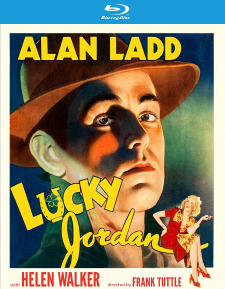Lucky Jordan (Blu-ray Review)

Director
Frank TuttleRelease Date(s)
1942 (March 21, 2023)Studio(s)
Paramount Pictures (Kino Lorber Studio Classics)- Film/Program Grade: B-
- Video Grade: A-
- Audio Grade: A-
- Extras Grade: B-
Review
Lucky Jordan (1942) is something of a cut-rate variation of All Through the Night, the hilarious Warner Bros. gangster-comedy-spy film released 11 months earlier, with Humphrey Bogart and myriad Warner contract players battling Nazi fifth columnists. Lucky Jordan is a Paramount film toplined by Alan Ladd in his first starring film, telling a similar tale, Ladd playing a gangster up against likeminded bad guys. Warners, what with their expertise with the gangster genre pulled off an improbable script, but Lucky Jordan is merely silly and often ludicrous.
New York racketeer Lucky Jordan (Ladd) is drafted into the army, 1-A status despite the best efforts of his “mouthpiece,” attorney Ernest Higgins (Lloyd Corrigan), to get him deferred, even attempting to pass off local panhandler-drunk Annie (Mabel Paige) as Lucky’s dependent “Ma.” Lucky shirks his duties at basic training by hanging out at the base canteen run by plucky Jill Evans (Helen Walker, in her film debut) and eventually he goes AWOL, commandeering a car. Outside the camp, two thugs try to steal a briefcase left in the vehicle, and eventually Lucky’s on the lam with a kidnapped Jill in tow. Back at his New York office, he finds that ambitious, conniving lieutenant Slip Morgan (Sheldon Leonard) has taken over the firm, now specializing in selling military secrets to fifth columnist Nazis. In an incredible coincidence, Slip’s latest deal involves the contents of the briefcase from the stolen vehicle.
One problem with the film is that its gangsters act and talk less like Warner Bros.’ roster of racketeers than Damon Runyon types, speaking gangster jargon that was probably anachronistic even in 1942. Indeed, “Ma” Annie is an obvious steal of Apple Annie, from Runyon’s Madame La Gimp, adapted as Frank Capra’s Lady for a Day (1933). Conversely, Ladd’s circumspect screen persona isn’t really suited to the title character, which cries out for a more flamboyant, energized James Cagney type.
Ladd had been kicking around Hollywood for a decade, making his debut in 1932, but most of those appearances were uncredited bit parts. As late as 1941 he was still appearing without billing in small roles, including Citizen Kane (as a reporter), Disney’s The Reluctant Dragon (as a storyboard artist), and in the terrible Laurel & Hardy comedy Great Guns (as a soldier). But a big break, fourth-billed as hitman Philip Raven in the classic noir This Gun for Hire, likewise directed by Frank Tuttle, propelled him to stardom. Paramount seems to have hedged their bets on Lucky Jordan, Ladd’s first movie where he received top billing. The picture is bigger than their average B-movie, but still inexpensive—a “nervous ‘A.’” It was probably shot in 20 days or so and cost less than $300,000. Tellingly, most of the film’s exteriors were shot on Paramount’s backlot New York street while Jordan’s underworld empire seems to consist of about three guys, and they all want him dead.
The best thing Lucky Jordan has going for it is the relationship between alcoholic Annie, who enjoys masquerading as Jordan’s “Ma” since she’s childless and lonely, despite her sunny disposition. Later in the story, Jordan also seems to enjoy having a doting surrogate mother to look after him. Paramount appears to have recognized this as the film’s main strength—a key scene has Lucky returning to Annie’s apartment, where the old lady has been badly beaten by the Nazi agents. (This, in turn, sheds Jordan’s selfishness and he does a complete turnabout, Jordan now a true American patriot. Of course.)
However, the awkward cutting of the scene suggests that it may originally had been filmed with Jordan finding Ma dead rather than badly beaten. His dialogue with the bruised Annie has the whiff of footage shot and inserted later.
Unlike Ladd, Helen Walker became an instant star with this, her first film. She excelled in both comedies and noir, in the latter genre most memorably in Nightmare Alley (1947). But, like Ladd, she had a troubled life and died at 47 in 1968, four years after Ladd’s untimely passing at 50. In a strange coincidence, they were buried virtually side-by-side. Further, Marie MacDonald, in a showy role as Jordan’s secretary, herself died at 42 in 1965, the end of yet another troubled life rivaling Ladd’s and Walker’s. At the start of promising careers, both Walker and MacDonald show much talent, and are lovely to look at.
Kino’s Blu-ray, licensed from Universal, presents Lucky Jordan in its original black-and-white, 1.37:1 standard ratio. Derived from a new 2K video master of a 35 mm fine grain, the image is strong with good blacks, contrast, and resolution. The English DTS-HD Master Audio (mono) is likewise above average. Optional English subtitles are provided and the disc is Region “A” encoded.
Extras consist of a new and pretty good audio commentary track by critic Samm Deighan, and a theatrical trailer (1:36) complete with text.
Lucky Jordan is reasonably diverting, but unexceptional, and its unreal (even by ‘40s Hollywood standards) gangsters and improbable plot don’t help it.
- Stuart Galbraith IV

